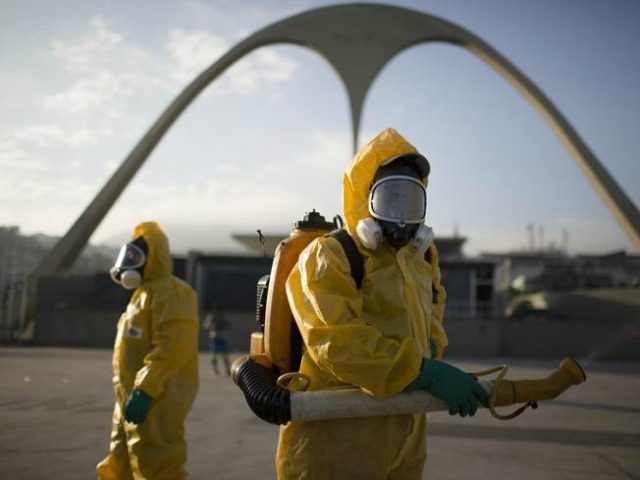The mayor of Rio de Janeiro, the host city for the 2016 Summer Olympics, insisted that the spread of the mosquito-borne Zika virus “is not a big issue” days after Brazilian researchers warned the disease has mutated into something “more dangerous.”
Less than a week after NBC News reported the Brazilian researchers’ findings, Rio Mayor Eduardo Paes told Sky News that visitors to the Olympic games this summer need not worry.
Paes’ comments, reported on May 16, also came despite the warnings from prominent Canadian public health professor Amir Attaran, who wrote in the Harvard Public Health Review last week that moving ahead with the Games would pose “a foreseeable global catastrophe.”
“There’s not many cases of the Zika virus, especially in the city of Rio,” claimed the mayor.
However, Brazilian government statistics released in late April revealed that the country had documented a staggering 91,387 Zika cases in 2016 alone, less than 1oo days from the start of the Olympics, with more than 7,000 of them linked to pregnant women.
At the time, Rio de Janeiro led the number of recorded Zika cases with 25,930. Brazil remains the most Zika-affected country.
Nevertheless, Rio Mayor Paes declared, “There is the issue with pregnant women and this is something we need to take care of, but I don’t know anyone who’s got the Zika virus, and I know a lot of people, so this is not a big issue.”
“Dengue fever, which we have in the summer time every year, is much worse than the Zika virus and nobody talks about Dengue fever,” he also said. “It is weird for us when we listen to the news outside. Sometimes I think people think it’s like Ebola. You’ve got to come and enjoy.”
The mayor alleged worries about the Olympics in Brazil are no different than in previous host cities.
“I remember when I got into London two or three days before the games, the newspapers were saying it was going to be chaos, terrible, everything is going to go wrong,” he told Sky News.
“Things will all go well and the Zika virus is not going to be a big issue,” he declared.
On May 11, NBC News reported that a study by Brazilian researchers published in the journal Nature “found evidence it may have evolved into a new form that’s more likely to damage brain cells and cause birth defects.”
“Much more research needs to be done to prove this — but the findings mesh with other findings that show mutations that make the Zika strain now circulating in Latin America and the South Pacific are different from older strains first seen in Africa in the 1940s and 1950s,” notes the news outlet.
Zika has been linked to the neurological disorder known as microcephaly, which causes babies to be born with abnormally small heads, and Guillain-Barre, a rare syndrome that causes the immune system to damage nerve cells, leading to muscle weakness and even paralysis.
“Our findings support the hypothesis that microcephaly is a distinctive feature of recent Zika virus Asian-lineage virus, which originated in the Pacific and is now spreading in South and Central America,” Patricia Beltrão-Braga of the University of Sao Paulo and colleagues wrote in the journal Nature.
However, the International Olympic Committee has refused to make any changes to the scheduled games.
Zika has spread across the world, and the World Health Organization (WHO) has declared it a public health emergency, with concerns that the virus can lead to birth defects among pregnant women.
The virus has been reported in 47 countries and territories, with Brazil being the country with the most Zika-linked microcephaly cases.
More than two billion people worldwide are at risk of contracting the Zika virus, according to a study recently published in eLife, a medical journal.
Breitbart News reported:
Alarm over the potential of a Zika outbreak in North America is growing as the weather warms in the Southern Hemisphere and Brazil, the epicenter of the Latin American outbreak, prepares for hundreds of thousands of tourists to descend upon it for this year’s Summer Olympics.
Zika can be contracted from an Aedes aegypti mosquito bite, a carrier, or transmission through sexual contact with a person carrying the virus, according to scientists.
“Australian pharmaceutical company Starpharma Holdings Ltd said it is teaming up with world No. 2 condom maker Ansell Ltd to supply Zika virus-proof condoms to the Australian Olympic team ahead of the 2016 Rio de Janeiro games,” reports Reuters.
“Starpharma said it is giving the Australian athletes Ansell ‘Dual Protect’ condoms lubricated with Starpharma’s VivaGel product, which it recently said showed near-total antiviral protection against Zika and other viruses in laboratory studies,” it added.

COMMENTS
Please let us know if you're having issues with commenting.